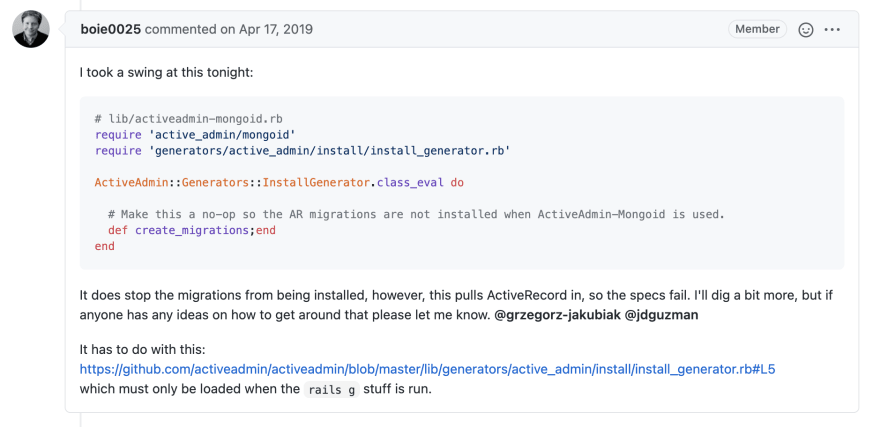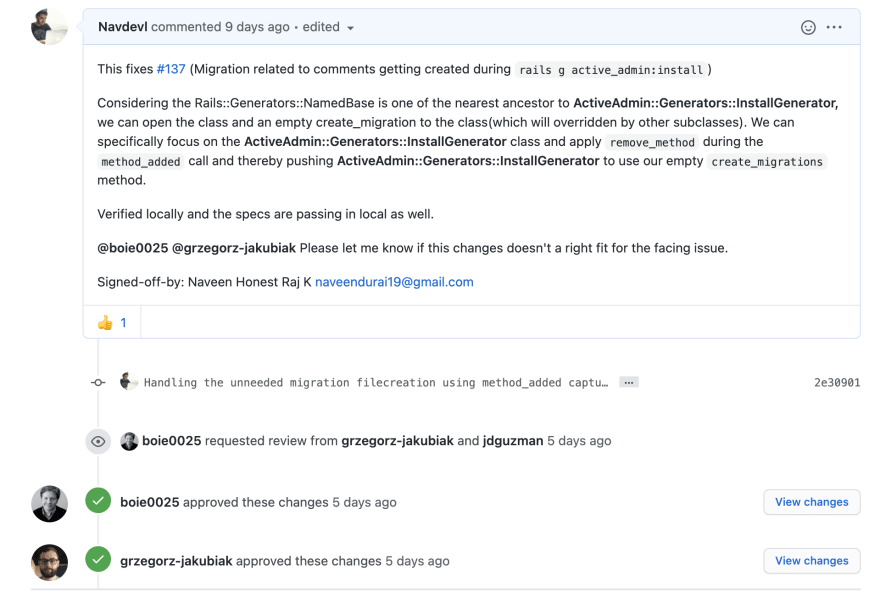63
Case study on Ruby Gem Contribution: activeadmin-mongoid
For the people who are very much in the Rails development, you definitely should've used Activeadmin on one of your projects. If not, please have a look at it. It is an amazing gem ran by a very understanding community.
For those who aren't familiar with Rails, this gem provides us to build admin controlled management side for the models present in the application quickly. Provides set of conventions and working along those lines, you can quickly get your admin dashboard ready. For Django-familiar people, it is similar to django-admin.
The gem activeadmin sits very well with the relational DB using Rails activerecord and for the projects that uses NoSQL DB like Mongo, there is another gem under the same umbrella - activeadmin-mongoid (https://github.com/activeadmin/activeadmin-mongoid)
ActiveAdmin is holding off on pulling Mongoid support into the core ActiveAdmin application. Maybe in future activeadmin will provide support for NoSQL directly through its gem.
This gem's repo was pulled into the ActiveAdmin org from previous work done by Elia Schito. Currently, it is maintained by Grzegorz Jakubiak, Nic Boie, JD Guzman, Elia Schito and other ActiveAdmin and community members.
Mongoid based Rails projects mostly won't require activerecord in their model methods and also wouldn't need any migration because we aren't dealing with the usual ideas of the SQL world.
Similarly, activeadmin-mongoid as a gem also avoids to require Rails's activerecord related elements. This is something to be considered when introducing any new additions to the gem. (atleast at the time of writing)
activeadmin-mongoid depends on the activeadmin and holds the generator calls like rake activeadmin:install to generate the initializer files. By default, the activeadmin generates configuration files and a db migration file as well.
So like we mentioned, db migration is valid in the world of SQL (within our context of explanation), but considering with Mongoid, that file is completely unnecessary and users were deleting them after it gets generated because it makes no sense and no use.
One user pointed that out and raised an issue on that. https://github.com/activeadmin/activeadmin-mongoid/issues/137
So I was a little bit curious to try solving that out. There were little discussions went on the thread and Nic Boie, one of the maintainers gave it a shot and added what he tried and what was the result. That helped me to set the first direction towards solving the issue. Thanks to Nic!

Ideally, Nic Boie's solution solved the problem. It stopped the command from generating the migration file. But, while trying to open the class and override the method to make it do nothing, he has to require certain files and these files required has dependent requires and one of them brought in the activerecord related files. So, now my task is to do the exact thing what Nic did, but without letting the activerecord getting required through any dependent calls or so.
This is the solution Nic provided
require 'active_admin/mongoid'
require 'generators/active_admin/install/install_generator.rb'
ActiveAdmin::Generators::InstallGenerator.class_eval do
# Make this a no-op so the AR migrations are not installed when ActiveAdmin-Mongoid is used.
def create_migrations;end
endSo, I took my time to read through the activeadmin gem and see for the class that Nic used above to override with class_eval.
Studying the class ActiveAdmin::Generators::InstallGenerator from here helped me to understand that the current class is the one which requires activerecord related files, but the parent class of this class doesn't requires any of those.
So the solution I came up with was, to go change the parent class of ActiveAdmin::Generators::InstallGenerator to do the following:
When a class subclasses from it, I need to change the way the subclass is described.
Then either override the method definition or disallow it from overriding.
Ruby has a wonderful hook on class called inherited which will be called when a class is used by another class to derive itself. Using that inherited you can control specific way of the derived class. Cool, isn't it? I even tweeted about it here https://twitter.com/nav_devl/status/1405329547701096452
The only caveat with the idea I had was, I assumed when the self.inherited was called, the subclass will be fully defined and I can just remove/override the definition of create_migrations method. But turns out, when the self.inherited was called, there are no user defined methods present. Only after the self.inherited is finished the the class implements all other user definied methods. 😔
Again, Ruby as charming as always, provides us with a hook called method_added and this is called every time a new method method definition is added to a class. Now can you see where we are heading towards?
So we are going to combine the advantage of self.inherited and self.method_added 🤯
So, now our next set of action is very simple.
- Define an empty
create_migrationsin the parent class. - When a class is derived from it, we are redefining the
self.method_added's definition. Classy, right? 😎 - So, if the derived class's name is
ActiveAdmin::Generators::InstallGeneratorwe are redefining theself.method_addedof that subclass to remove the method definition ofcreate_migration -
remove_methodwill remove only the method definition scoped to that class, so our derived class will now lookup to parent class for definition whencreate_migrationis called. - And we have an empty NO ACTION definition in our parent class.
- No activerecord related items are required while doing this.
- Bam! 🎉🎉
Rails::Generators::NamedBase.class_eval do
def create_migrations
end
def self.inherited(klass)
super
if klass.name == "ActiveAdmin::Generators::InstallGenerator"
klass.class_eval do
def self.method_added(method_name)
super
remove_method method_name if method_name == :create_migrations
end
end
end
end
end
63
